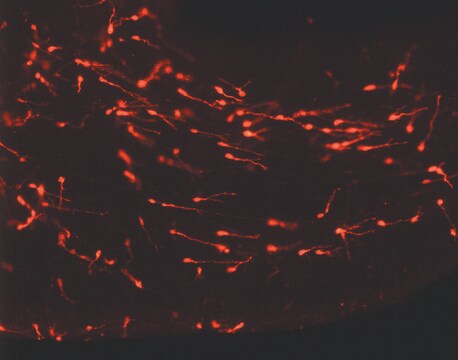Alle Fotos(1)
Wichtige Dokumente
18620
Atto 633
BioReagent, suitable for fluorescence
Anmeldenzur Ansicht organisationsspezifischer und vertraglich vereinbarter Preise
Alle Fotos(1)
About This Item
Empfohlene Produkte
Produktlinie
BioReagent
Qualitätsniveau
Assay
≥90.0% (HPLC)
Form
solid
Hersteller/Markenname
ATTO-TEC GmbH
λ
in ethanol (with 0,1% trifluoroacetic acid)
UV-Absorption
λ: 627-633 nm Amax
Eignung
suitable for fluorescence
Lagertemp.
−20°C
Anwendung
Atto 633 is a red-emitting fluorescence label with strong absorption, high quantum yield (64%), high photostability, good water solubility, and very little triplet formation. This label is optimized for use with diode laser excitation at 633 nm and characterized by high photostability.
Rechtliche Hinweise
This product is for Research use only. In case of intended commercialization, please contact the IP-holder (ATTO-TEC GmbH, Germany) for licensing.
Sie haben nicht das passende Produkt gefunden?
Probieren Sie unser Produkt-Auswahlhilfe. aus.
Lagerklassenschlüssel
11 - Combustible Solids
WGK
WGK 3
Flammpunkt (°F)
Not applicable
Flammpunkt (°C)
Not applicable
Persönliche Schutzausrüstung
Eyeshields, Gloves, type N95 (US)
Hier finden Sie alle aktuellen Versionen:
Besitzen Sie dieses Produkt bereits?
In der Dokumentenbibliothek finden Sie die Dokumentation zu den Produkten, die Sie kürzlich erworben haben.
Kunden haben sich ebenfalls angesehen
Martin Beutler et al.
European biophysics journal : EBJ, 38(1), 69-82 (2008-09-05)
We demonstrate theoretically and experimentally the quantification of Förster resonance energy transfer (FRET) by direct and systematic saturation of the excited state of acceptor molecules. This version of acceptor depletion methods for FRET estimation, denoted as "satFRET" is reversible and
Sotirios S Tragoulias et al.
Analytical and bioanalytical chemistry, 390(6), 1563-1573 (2008-01-30)
Microarray technology covers the urgent need to exploit the accumulated genetic information from large-scale sequencing projects and facilitate investigations on a genome-wide scale. Although most applications focus on DNA microarrays, the technology has expanded to microarrays of proteins, peptides, carbohydrates
Maria Strianese et al.
Protein and peptide letters, 18(3), 282-286 (2010-09-23)
A new, fast, simple and cost-effective sensing device for monitoring H(2)S has been developed. Proof-of-principle results showing that a commercial and cheap Myoglobin (Mb) can be successfully used as a biological probe for a fluorescence biosensor for H(2)S detection are
Julian Weichsel et al.
Cytometry. Part A : the journal of the International Society for Analytical Cytology, 77(1), 52-63 (2009-11-10)
The actin cytoskeleton modulates a large variety of physiological and disease-related processes in the cell. For example, actin has been shown to be a crucial host factor for successful infection by HIV-1, but the underlying mechanistic details are still unknown.
Thomas D Lazzara et al.
Journal of colloid and interface science, 366(1), 57-63 (2011-10-29)
Anodic aluminum oxide (AAO) substrates with aligned, cylindrical, non-intersecting pores with diameters of 75 nm and depths of 3.5 or 10 μm were functionalized with lipid monolayers harboring different receptor lipids. AAO was first functionalized with dodecyl-trichlorosilane, followed by fusion
Unser Team von Wissenschaftlern verfügt über Erfahrung in allen Forschungsbereichen einschließlich Life Science, Materialwissenschaften, chemischer Synthese, Chromatographie, Analytik und vielen mehr..
Setzen Sie sich mit dem technischen Dienst in Verbindung.



